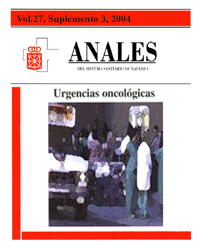Principal infections in the oncology patient: practical treatment
Keywords:
Fiebre. Neutropenia. Cáncer. Inmunosupresión.Abstract
Infectious complications are one of the most important causes of morbi-mortality in oncology patients. Neutropenia is the most important risk factor for developing infection in the oncology patient. Although the highest mortalities continue to be associated with infections due to enterobacterias and Pseudomonas aeruginosa, the frequency of infections due to gram-positives is higher. Deep fungic infections, like those produced by resistant or infrequent bacteria usually occur in late periods of protracted neutropenias. In recent years different studies have shown the efficiency of antibiotic patterns in monotherapy in the treatment of the neutropenic patient with fever. Cellular immunosuppression is not usually as relevant as neutropenia in oncology patients without complications. However, the use of high doses of steroids in some patients and above all the use of purine analogues and monoclonal antibodies has changed this situation in recent years. With these patients it is recommendable to use prophylactic measures directed against Cytomegalovirus, Varicela-zoster virus, P.carinii (or jirovecii) and fungic infections. Bacteraemia associated with endovascular catheterisation is the principal cause of bacteraemia in these patients, above all due to gram-positive micro-organisms. In case of infection, it is always advisable to remove the catheter. However, under certain circumstances, where the placing of a new catheter might be risky given the patient’s characteristics and where there are agents of low virulence (e.g. coagulase-negative staphylococcus), a conservative treatment can be tried. A persistence of fever or bacteraemia following removal of the catheter should lead to suspicion of the presence of a deep infection, fundamentally suppurated thrombophlebitis or endocarditis. An adequate understanding of the infectious complications in these patients and their correct treatment and prevention are decisive in reducing the high mortality associated with these clinical manifestations.Downloads
Downloads
Published
How to Cite
Issue
Section
License
La revista Anales del Sistema Sanitario de Navarra es publicada por el Departamento de Salud del Gobierno de Navarra (España), quien conserva los derechos patrimoniales (copyright ) sobre el artículo publicado y favorece y permite la difusión del mismo bajo licencia Creative Commons Reconocimiento-CompartirIgual 4.0 Internacional (CC BY-SA 4.0). Esta licencia permite copiar, usar, difundir, transmitir y exponer públicamente el artículo, siempre que siempre que se cite la autoría y la publicación inicial en Anales del Sistema Sanitario de Navarra, y se distinga la existencia de esta licencia de uso.








